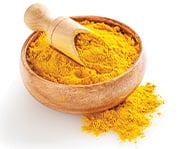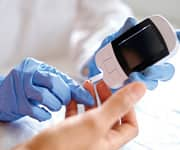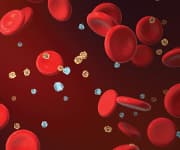Life Extension Magazine.
An estimated 537 million adults worldwide have type II diabetes, and the numbers are rising.1
The high blood sugar that defines diabetes can lead to a host of dangerous conditions including heart disease, vision loss, kidney failure, and other major health problems.2 All of which significantly contribute to accelerated aging.3
Curcumin, derived from the turmeric root, has been clinically shown to help reduce multiple risk factors for type II diabetes and to lower elevated blood sugar in those with diabetes or prediabetes.4-6
Managing type II diabetes can be challenging for both patient and doctor. While physicians usually recommend diet, exercise, and medications for treating patients with type II diabetes, research is showing that curcumin can provide additional support.6
Insulin Resistance and Diabetes
When we take in food, our blood sugar rises. That signals the pancreas to release a hormone called insulin, which helps cells use that glucose for energy. As a result, blood sugar falls again.
Type II diabetes results from insulin resistance when cells don't respond properly to the hormone. Blood sugar levels stay elevated, which is known as hyperglycemia.7
Hyperglycemia can lead to systemic complications including diseases of the heart, blood vessels, kidneys, eyes, and nervous system, and an increased risk for cancer.2
How Diabetes Harms the Body
Inflammation likely contributes to the development of insulin resistance, and worsens hyperglycemia, in diabetes. 8,9
That high blood sugar triggers more inflammation, which drives accelerated aging10 and risk for chronic illness, including heart disease and cancer.9,11,12
Excess glucose also leads to oxidative stress, which can severely damage cells and tissues.8,13 Among other problems, oxidative stress results in:14
- Decreased glucose transport and insulin secretion,
- Protein and DNA damage,
- Increased vascular permeability.
How Curcumin Helps
For thousands of years, turmeric root has been used as a traditional Asian medicine.
The most studied compounds in turmeric are curcuminoids, which include curcumin and related compounds.15-17
Scientists have discovered that curcumin has multiple molecular targets that make it ideal for modulating certain molecular pathways to help reduce the risk of elevated blood sugar.18,19
Specifically, curcumin has many health-promoting properties, including antioxidant, anti-inflammatory and blood sugar lowering effects.18,19
Curcumin can help protect against the development of diabetes and the harm diabetes can do in multiple ways, including:18
- Activating PPAR-gamma, a metabolic regulator that increases insulin sensitivity and lowers insulin resistance,18,20
- Anti-inflammatory actions, including inhibiting signaling molecules that increase inflammation,18
- Improving the function and health of cells that make insulin,18,21
- Reducing the formation of advanced glycation end products and protecting against the damage they can do,22,23
- Antioxidant activity, which reduces oxidative stress, and
- Improving lipid levels, reducing some markers of metabolic dysfunction and heart disease.
In animal models, curcumin extract shows promise in helping to prevent diabetes development and decreases insulin resistance.15,18,19,24
Human Trials
Clinical trials and meta-analyses have shown that curcumin intake can benefit those with type II diabetes or prediabetes, and even those who are completely healthy.6,21,25-27
In a randomized controlled trial of overweight people with type II diabetes, taking 1500 mg of curcumin for 10 weeks resulted in significantly lower fasting blood glucose of 7mg/dl in those taking the curcumin supplements as compared to the baseline group.
In the placebo arm of this study, a 3 mg/dl rise was observed as compared to baseline. Additionally, there was a decline in body weight by 1.4 lbs. in average body weight in the group that received curcumin as compared to the baseline.25
Another trial of patients with type II diabetes found that taking 1500 mg of curcumin for 10 weeks decreased triglycerides and inflammatory markers. Interestingly, it also increased levels of adiponectin, a hormone that enhances insulin sensitivity.26 Low levels of adiponectin are associated with type II diabetes and obesity.28
What You Need to Know
Help Prevent and Control Diabetes
- High blood sugar and type II diabetes cause damage throughout the body.
- Curcumin, derived from the turmeric root, can reduce multiple risk factors for developing diabetes, including oxidative stress and inflammation.
- Curcumin also reduces insulin resistance and lowers high blood sugar, helping to prevent the worst damage diabetes can do.
Wide-Ranging Antidiabetic Benefits
Many reviews and analyses of clinical trials have also concluded that curcumin can be a beneficial support to help manage diabetes and metabolic health.
In a review of seven clinical studies of people with type II diabetes, taking curcumin at doses ranging from 80 mg to 1500 mg led to improvements across a range of health markers related to type II diabetes:6
- Improvement in lipid levels, including reductions in total cholesterol, LDL cholesterol, a lipid that increases risk of heart disease, and
- Reduction in HbA1c levels (frequently used to diagnose prediabetes and diabetes) on average 0.42% in treatment groups as compared to baseline.
Additional reviews of trials in people with type II diabetes and prediabetes found that taking curcumin led to improvements in insulin and blood sugar levels, Increased levels of adiponectin, the hormone that improves insulin sensitivity, liver enzymes, lipid levels, and more.5,29
Taken together, these studies and reviews show that curcumin may lower the chances of developing type II diabetes to begin with and can reduce some of its consequences in those who already suffer from diabetes.
Summary
Type II diabetes is an escalating epidemic.
Curcumin has shown an ability to help prevent its development.
It also lowers damaging high blood sugar and prevents some of its unhealthy effects in those who already have type II diabetes or prediabetes.
A Better Curcumin
Taken orally, traditional curcumin is difficult to absorb.30-32
Scientists found a way around this problem by combining curcumin with galactomannan, a form of fiber derived from the spice fenugreek. This prevents modification of curcumin in the gut and increases its bioavailability.
This form of curcumin has been shown to increase bioactive free curcumin in human and laboratory studies.30-32 In one clinical trial, this unique extract increased curcumin levels in the blood more than 45 times higher than unformulated curcumin.31
References
- Available at: https://www.ncbi.nlm.nih.gov/books/NBK581940/. Accessed January 11, 2023.
- Available at: https://www.cdc.gov/diabetes/managing/problems.html. Accessed January 11, 2024.
- Bahour N, Cortez B, Pan H, et al. Diabetes mellitus correlates with increased biological age as indicated by clinical biomarkers. Geroscience. 2022Feb;44(1):415-27.
- Jie Z, Chao M, Jun A, et al. Effect of Curcumin on Diabetic Kidney Disease: A Systematic Review and Meta-Analysis of Randomized, Double-Blind, Placebo-Controlled Clinical Trials. Evid Based Complement Alternat Med. 2021;2021:6109406.
- Rivera-Mancía S, Trujillo J, Chaverri JP. Utility of curcumin for the treatment of diabetes mellitus: Evidence from preclinical and clinical studies. Journal of Nutrition & Intermediary Metabolism. 20182018/12/01/;14:29-41.
- Altobelli E, Angeletti PM, Marziliano C, et al. Potential Therapeutic Effects of Curcumin on Glycemic and Lipid Profile in Uncomplicated Type 2 Diabetes-A Meta-Analysis of Randomized Controlled Trial. Nutrients. 2021 Jan 27;13(2).
- Available at: https://www.niddk.nih.gov/health-information/diabetes/overview/what-is-diabetes. Accessed January 11, 2024.
- Rehman K, Akash MSH. Mechanisms of inflammatory responses and development of insulin resistance: how are they interlinked? Journal of Biomedical Science. 20162016/12/03;23(1):87.
- Wu H, Ballantyne CM. Metabolic Inflammation and Insulin Resistance in Obesity. Circulation Research. 2020;126(11):1549-64.
- Park MH, Kim DH, Lee EK, et al. Age-related inflammation and insulin resistance: a review of their intricate interdependency. Arch Pharm Res. 2014Dec;37(12):1507-14.
- Ma X, Nan F, Liang H, et al. Excessive intake of sugar: An accomplice of inflammation. Front Immunol. 2022;13:988481.
- Shen CY, Lu CH, Wu CH, et al. The Development of Maillard Reaction, and Advanced Glycation End Product (AGE)-Receptor for AGE (RAGE) Signaling Inhibitors as Novel Therapeutic Strategies for Patients with AGE-Related Diseases. Molecules. 2020 Nov 27;25(23).
- Available at: https://www.ncbi.nlm.nih.gov/books/NBK576381/. Accessed 11/12/2023.
- Bhatti JS, Sehrawat A, Mishra J, et al. Oxidative stress in the pathophysiology of type 2 diabetes and related complications: Current therapeutics strategies and future perspectives. Free Radical Biology and Medicine. 2022 2022/05/01/;184:114-34.
- Parsamanesh N, Moossavi M, Bahrami A, et al. Therapeutic potential of curcumin in diabetic complications. Pharmacol Res. 2018 Oct;136:181-93.
- de Melo ISV, Dos Santos AF, Bueno NB. Curcumin or combined curcuminoids are effective in lowering the fasting blood glucose concentrations of individuals with dysglycemia: Systematic review and meta-analysis of randomized controlled trials. Pharmacol Res. 2018 Feb;128:137-44.
- Sharifi-Rad J, Rayess YE, Rizk AA, et al. Turmeric and Its Major Compound Curcumin on Health: Bioactive Effects and Safety Profiles for Food, Pharmaceutical, Biotechnological and Medicinal Applications. Front Pharmacol. 2020;11:01021.
- Pivari F, Mingione A, Brasacchio C, Soldati L. Curcumin and Type 2 Diabetes Mellitus: Prevention and Treatment. Nutrients. 2019 Aug 8;11(8).
- Zhang DW, Fu M, Gao SH, Liu JL. Curcumin and diabetes: a systematic review. Evid Based Complement Alternat Med. 2013;2013:636053.
- Li H-Y, Yang M, Li Z, Meng Z. Curcumin inhibits angiotensin II-induced inflammation and proliferation of rat vascular smooth muscle cells by elevating PPAR-γ activity and reducing oxidative stress. Int J Mol Med. 2017 2017/05/01;39(5):1307-16.
- Chuengsamarn S, Rattanamongkolgul S, Luechapudiporn R, et al. Curcumin extract for prevention of type 2 diabetes. Diabetes Care. 2012 Nov;35(11):2121-7.
- Alizadeh M, Kheirouri S. Curcumin against advanced glycation end products (AGEs) and AGEs-induced detrimental agents. Crit Rev Food Sci Nutr. 2019;59(7):1169-77.
- Prasad K, Tiwari S. Therapeutic Interventions for Advanced Glycation-End Products and its Receptor- Mediated Cardiovascular Disease. Curr Pharm Des. 2017Oct 06;23(6):937-43.
- Lu W, Khatibi Shahidi F, Khorsandi K, et al. An update on molecular mechanisms of curcumin effect on diabetes. J Food Biochem. 2022 Oct;46(10):e14358.
- Hodaei H, Adibian M, Nikpayam O, et al. The effect of curcumin supplementation on anthropometric indices, insulin resistance and oxidative stress in patients with type 2 diabetes: a randomized, double-blind clinical trial. Diabetol Metab Syndr. 2019;11:41.
- Adibian M, Hodaei H, Nikpayam O, et al. The effects of curcumin supplementation on high-sensitivity C-reactive protein, serum adiponectin, and lipid profile in patients with type 2 diabetes: A randomized, double-blind, placebo-controlled trial. Phytother Res. 2019 May;33(5):1374-83.
- Dehzad MJ, Ghalandari H, Nouri M, Askarpour M. Effects of curcumin/turmeric supplementation on glycemic indices in adults: A grade-assessed systematic review and dose-response meta-analysis of randomized controlled trials. Diabetes Metab Syndr. 2023 Oct;17(10):102855.
- Achari AE, Jain SK. Adiponectin, a Therapeutic Target for Obesity, Diabetes, and Endothelial Dysfunction. Int J Mol Sci. 2017 Jun 21;18(6).
- Zhang T, He Q, Liu Y, et al. Efficacy and Safety of Curcumin Supplement on Improvement of Insulin Resistance in People with Type 2 Diabetes Mellitus: A Systematic Review and Meta-Analysis of Randomized Controlled Trials. Evid Based Complement Alternat Med. 2021 2021/08/25;2021:4471944.
- Matthewman C, Krishnakumar IM, Swick AG. Review: bioavailability and efficacy of 'free' curcuminoids from curcumagalactomannoside (CGM) curcumin formulation. Nutr Res Rev. 2023 Jan 19:1-18.
- Kumar D, Jacob D, Subash PS, et al. Enhanced bioavailability and relative distribution of free (unconjugated) curcuminoids following the oral administration of a food-grade formulation with fenugreek dietary fibre: A randomised double-blind crossover study. J Funct Foods. 2016;22:578-87.
- Krishnakumar IM, Maliakel A, Gopakumar G, Kumar D. Improved blood–brain-barrier permeability and tissue distribution following the oral administration of a food-grade formulation of curcumin with fenugreek fibre. Journal of Functional Foods. 2015;14(215-225).





